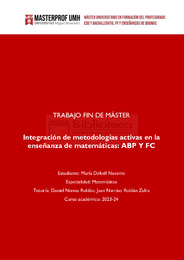Please use this identifier to cite or link to this item:
https://hdl.handle.net/11000/32874Full metadata record
| DC Field | Value | Language |
|---|---|---|
| dc.contributor.advisor | NIEVES ROLDÁN, DANIEL | - |
| dc.contributor.advisor | ROLDÁN ZAFRA, JUAN | - |
| dc.contributor.author | Deltell Navarro, María | - |
| dc.date.accessioned | 2024-08-02T09:37:29Z | - |
| dc.date.available | 2024-08-02T09:37:29Z | - |
| dc.date.created | 2024-06 | - |
| dc.identifier.uri | https://hdl.handle.net/11000/32874 | - |
| dc.description | Especialidad: Matemáticas | es_ES |
| dc.description.abstract | En la vida cotidiana y en general en todos los ámbitos, son un hecho los entornos de trabajo cooperativos y colaborativos puesto que el mundo laboral lo exige. Es por ello que las metodologías tradicionales que veníamos conociendo se han ido quedando obsoletas y surge la necesidad de incorporar otras más innovadoras en el ámbito de la educación. Estas nuevas metodologías deben permitir que el alumno adquiera las habilidades sociales que se exigen actualmente para satisfacer las necesidades de la sociedad como profesionales. En este Trabajo de Fin de Máster establecemos el marco teórico de dos metodologías activas a través de la correspondiente revisión bibliográfica y realizamos una propuesta didáctica donde estas se aplique. Las dos metodologías que se investigan son: Flipped Classroom o aula invertida (FC) y Aprendizaje Basado en Proyectos o problemas (ABP), que actualmente han sustituido a las formas tradicionales de enseñanza y que tienen mayores beneficios para el alumnado. En este Trabajo de Fin de Máster establecemos el marco teórico de dos metodologías activas a través de la correspondiente revisión bibliográfica y realizamos una propuesta didáctica donde estas se aplique. Por lo que, tras realizar este trabajo, la conclusión que se tiene es que el uso y aplicación de estas metodologías ha sido efectivo cuando se ha aplicado en materias como matemáticas y debido al aumento de las nuevas tecnologías cada vez son más utilizadas. | es_ES |
| dc.description.abstract | In everyday life and in general in all areas, cooperative and collaborative work environments are a fact since the world of work demands it. This is why the traditional methodologies that we have been familiar with have become obsolete and the need arises to incorporate more innovative ones in the field of education. These new methodologies must allow the student to acquire the social skills that are currently required to meet the needs of society as professionals. In this Master's Thesis we establish the theoretical framework of two active methodologies through the corresponding bibliographic review and we make a didactic proposal where these are applied. The two methodologies investigated are: Flipped Classroom or inverted classroom (FC) and Project- or Problem-Based Learning (PBL), which have currently replaced traditional forms of teaching and have greater benefits for students. In this Master's Thesis we establish the theoretical framework of two active methodologies through the corresponding bibliographic review and we make a didactic proposal where these are applied. Therefore, after carrying out this work, the conclusion is that the use and application of these methodologies has been effective when it has been applied in subjects such as mathematics and due to the increase in new technologies, they are increasingly. | es_ES |
| dc.format | application/pdf | es_ES |
| dc.format.extent | 35 | es_ES |
| dc.language.iso | spa | es_ES |
| dc.publisher | Universidad Miguel Hernández | es_ES |
| dc.rights | info:eu-repo/semantics/openAccess | es_ES |
| dc.rights.uri | http://creativecommons.org/licenses/by-nc-nd/4.0/ | * |
| dc.subject | Flipped classroom | es_ES |
| dc.subject | Aprendizaje basado en problemas | es_ES |
| dc.subject | Tecnologías | es_ES |
| dc.subject.other | CDU::3 - Ciencias sociales::37 - Educación. Enseñanza. Formación. Tiempo libre | es_ES |
| dc.title | Integración de metodologías activas en la enseñanza de matemáticas: ABP y FC | es_ES |
| dc.type | info:eu-repo/semantics/masterThesis | es_ES |

View/Open:
TFM Deltell Navarro, María.pdf
762,44 kB
Adobe PDF
Share:
.png)
